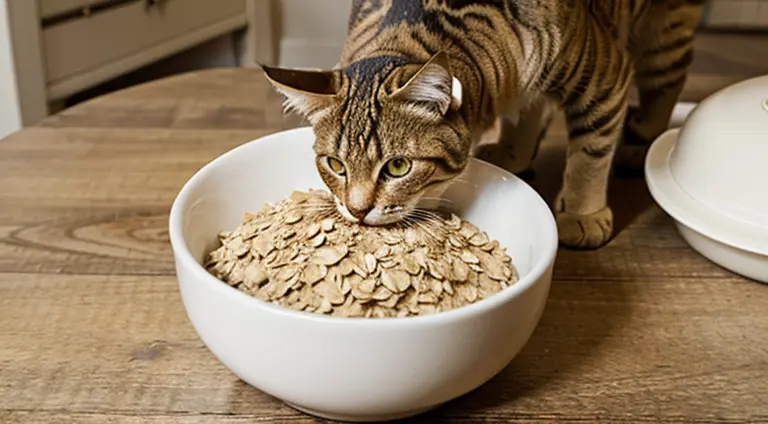Sometimes you love your cat so much you want to offer her more than kibble or the hundredth can of commercial cat food.
For me, a wonderful treat may be a time to bond—bonus points if you prep or cook. While your cat may not care, it will thank you in feline karma. Oatmeal is one such treat I occasionally enjoy.
You’re probably thinking that oats wouldn’t appeal to a cat. They have a taste for savory, putrid foods. In addition, they eat meat. Oatmeal: safe for cats to eat?
However, it is true cats eat oatmeal, and doing so occasionally is beneficial to their health.
Can Cats Eat Oatmeal?
Yes, cats eat oatmeal in moderation. Oatmeal can constitute a tiny portion of a cat’s diet, but they need to eat predominantly a diet high in animal protein because they are obligate carnivores. There are a few things to keep in mind when considering giving your cat oatmeal:
Nutritional Value: Oatmeal is a source of dietary fiber, vitamins, and minerals. However, it does not provide the essential nutrients cats need from their primarily meat-based diet.
Preparation: If you decide to give your cat oatmeal, it should be cooked and served plain. Avoid adding any sugar, salt, or flavorings, which can be harmful to cats.
Moderation is Crucial: Oatmeal should only be a small portion of a cat’s diet. Their main meals should consist of high-quality cat food formulated to meet their nutritional needs.
Monitor for Allergies or Digestive Issues: Every cat is different, and some may have sensitivities or allergies to grains. Introduce oatmeal slowly and watch for any signs of digestive distress or allergic reactions.
Is Oatmeal Good For Cats?
Yes, oatmeal can be good for cats in moderation, though it’s not a necessary part of their diet. why oatmeal can be beneficial for cats:
Dietary Fiber: Oatmeal contains dietary fiber, which can aid in a cat’s digestion and help with issues like constipation. However, cats don’t require a lot of fiber in their diet.
Vitamins and Minerals: Oats are a source of vitamins, like B vitamins, which are beneficial for cats. They also contain minerals such as iron.
Less Sugar and Fat: Oatmeal is low in sugars and fats, making it a healthier grain option if you choose to include grains in your cat’s diet.
In limited amounts, oatmeal can be a nutritious addition to a cat’s diet, but it shouldn’t replace their meat-based diet. Consult a vet before making major nutrition adjustments for your cat.
Read About: Can Dogs Eat Bread

How Much Oatmeal Should You Give Your Cat?
When feeding oatmeal to your cat, it’s essential to do so in moderation due to their specific nutritional needs as obligate carnivores. Here are some guidelines:
Small Portions: Oatmeal should only be a small part of your cat’s diet. A good rule of thumb is to keep the oatmeal serving size small, such as a teaspoon or two, especially when you’re introducing it for the first time.
Occasional Treat: Oatmeal should be considered a treat, not a regular part of your cat’s daily diet. It’s best given occasionally, not daily.
Balance with Regular Diet: Ensure that the majority of your cat’s diet is a high-quality, commercially available cat food that’s specifically formulated to meet their nutritional needs. Oatmeal should not replace this.
Your Cat’s Reaction: Observe how your cat reacts to oatmeal. If you notice any signs of digestive upset or allergic reactions (like itching or skin irritations), discontinue feeding oatmeal and consult your veterinarian.
Remember, every cat is different. Some may tolerate oatmeal well, while others may not. It’s always a good idea to consult with your veterinarian before introducing new foods into your cat’s diet. They can provide personalized advice based on your cat’s health, age, and nutritional needs.
How to Make Oatmeal For Cats: Two Easy Oatmeal Recipes
Creating oatmeal dishes for your cat is quite simple, as the key is to keep the recipes plain and free of any additives that might be harmful to cats. Here are two easy recipes for cat-friendly oatmeal:
Making Cat Oatmeal: Method 1
To create oat tea, just soak a tablespoon of oats in a cup of water for 15 to 20 minutes, then drain off the oats and drink the tea. Before adding it to dry kibble or enhancing canned food, let this nutrient-rich liquid cool to room temperature. It also keeps well in the fridge for up to six days if made in a bigger quantity.
Since cats don’t have the same thirst as humans, adding some oatmeal tea to their dry diet can help them get the moisture they need. Paderewski suggests addressing the issue that “they don’t like to drink water” because it is prevalent. They often obtain it from their diet. If the owner sees their cat urinating frequently during the day, I reassure them that their feline is getting enough water.
Making a Cat Meal from Oats: Method 2
For a meal, boil 1/4 cup of water, add 1/8 cup of oats, and simmer, stirring periodically, for 20 minutes until soft. Again, chill before serving.
Try adding brown sugar or salt to see if your cat likes it. Even pumpkin puree will please them. A delicious feline brunch? Replace with scrambled eggs!
What Other Human Foods Can Cats Eat?
Cats can safely enjoy certain human foods as occasional treats, but it’s important to remember that these should only supplement a diet that’s primarily composed of high-quality cat food. Here are some human foods that are generally safe for cats in moderation:
Cooked Meat: Chicken, turkey, lean beef, and lamb, cooked without any seasoning, are good sources of protein.
Fish: Cooked fish like salmon or tuna can be a healthy treat, providing omega-3 fatty acids. However, fish should be given sparingly due to potential heavy metals and other contaminants.
Eggs: Cooked eggs, either boiled or scrambled without any added butter or seasoning, can be a good protein source.
Vegetables: Some cats might enjoy small portions of cooked carrots, broccoli, green beans, or asparagus. These should be steamed or boiled without any added oils or seasonings.
Fruits: Small amounts of fruits like apples (without seeds), bananas, blueberries, or melon can be offered. Avoid grapes, raisins, and citrus fruits, which are harmful to cats.
Cooked Pumpkin or Squash: Plain, cooked pumpkin or squash can aid in digestion. Ensure it’s pure and free from additives or spices.
Cheese and Yogurt: Some cats can tolerate small amounts of cheese or plain yogurt, although many cats are lactose intolerant, so these should be given cautiously.
Rice and Pasta: Cooked rice or pasta can be given occasionally in small amounts, but they offer limited nutritional value for cats.
conclusion
While cats primarily thrive on a diet rich in animal proteins, certain human foods like oatmeal, cooked meats, select fruits and vegetables, and some dairy products can be offered in moderation as treats. It’s crucial to introduce these foods cautiously, keeping in mind the unique dietary needs and potential sensitivities of cats. Foods that are safe for human consumption can sometimes be harmful to cats, so it’s important to avoid toxic foods like onions, garlic, grapes, and chocolate, and to serve all treats plain, without added sugars, salts, or seasonings. As each cat is different, observing how your cat responds to new foods and consulting with a veterinarian for personalized advice is always recommended. Ultimately, the best approach is to ensure that these human foods only supplement a well-balanced, high-quality commercial cat food diet, ensuring your feline friend stays healthy and happy.
Frequently Asked Questions (FAQs)
Can cats eat oatmeal?
Yes, cats eat oatmeal in moderation. It should be plain, cooked, and given as a small part of their diet. Oatmeal can provide dietary fiber and is low in sugar and fat, but it shouldn’t replace a cat’s regular meat-based diet.
What human foods are safe for cats to eat?
Cats can safely eat small amounts of cooked meats (like chicken, turkey, and lean beef), cooked fish, eggs, certain vegetables (like carrots and green beans), and limited fruits (such as apples and melons). Dairy products should be given cautiously as many cats are lactose intolerant.
Are there any human foods that are dangerous for cats?
Yes, certain human foods are toxic to cats, including chocolate, caffeine, alcohol, onions, garlic, chives, grapes, raisins, and anything containing the sweetener xylitol. Foods high in salt, sugar, and fats should also be avoided.
How much oatmeal can I feed my cat?
Oatmeal should only be a small treat, not a regular part of your cat’s diet. A teaspoon or two, served occasionally, is sufficient. Always start with a small amount to see how your cat reacts.
Should cats eat a grain-free diet?
While cats are obligate carnivores and require a diet high in meat-based proteins, some cats may tolerate grains like oatmeal. However, their primary diet should be high-quality cat food formulated to meet their nutritional needs. The necessity of a grain-free diet varies from cat to cat and should be discussed with a veterinarian, especially for cats with specific health issues.

